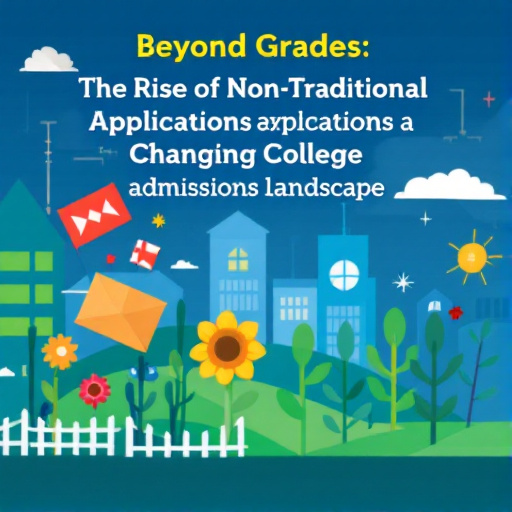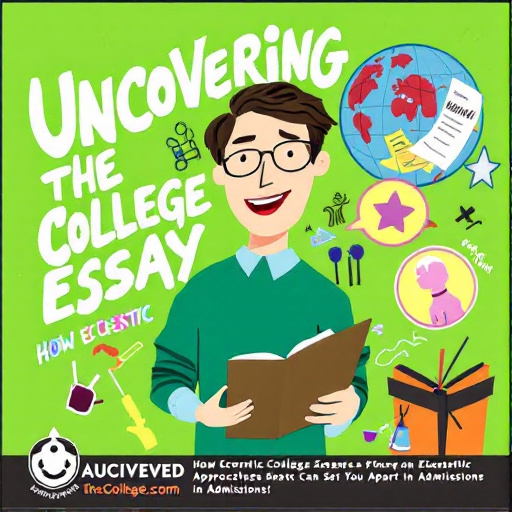Featured Articles
- 5 Unexpected Financial Aid Secrets Every College Applicant Must Know Before You Submit
- "Beyond Grades: How Mental Health Spaces Are Shaping College Applications in 2023"
- "Beyond Grades: The Rise of Non-Traditional Applications in a Changing College Admissions Landscape"
- Beyond the Basics: How TikTok Influencers are Shaping College Application Trends in 2023
- The Hidden Cost of College Applications: How Mental Health Influences Admission Success
"Uncovering the College Essay: How Eccentric Approaches Can Set You Apart in Admissions!"
"Uncovering the College Essay: How Eccentric Approaches Can Set You Apart in Admissions!"
Unconventional college essays can make a significant impact in the admissions process by showcasing your unique personality and perspective. This article explores various eccentric approaches to crafting essays that captivate readers and set you apart from the rest of the applicants.
Why It Matters
In a world filled with cookie-cutter essays, standing out is essential. According to the National Association for College Admission Counseling, 70% of admissions officers consider the college essay as an important factor in evaluating applicants (NACAC, 2019). An extraordinary essay can be the difference between acceptance and rejection.
The Power of Storytelling
Storytelling is an art form—and it's one of the most effective ways to engage your audience. Let’s take a look at the story of Jane, who recounted her experience working at an animal shelter. Instead of listing her qualifications, she painted a vivid picture of a day when she nursed an injured puppy back to health. This emotional narrative brought her application to life, allowing the admissions committee to connect with her on a personal level.
Use Humor Wisely
Injecting humor into your essay can be risky, but when done correctly, it has the potential to resonate with your readers. For instance, Matthew, a witty 18-year-old, opened his essay with a funny anecdote about attempting to cook dinner for his family, which ended up setting off the smoke alarm. This light-hearted approach not only showcased his sense of humor, but it also revealed his resilience as he learned to embrace the chaos of life. Humor should be relatable, not forced; after all, laughter is the best medicine, especially when the application process can be so stressful.
Breaking the Rules
Sometimes, the best way to stand out is to challenge conventions. Instead of a traditional essay format, consider creating a visual essay or even composing a series of letters. For example, Lucy used her essay to compose a dialogue between herself and her future self, reflecting on her aspirations. This strategy not only showcased her creativity but also demonstrated her ability to think outside the box—qualities that are attractive to colleges.
Statistics: The Importance of a Unique Perspective
Imagine this: 9 out of 10 college admissions officers agree that authenticity matters most in an applicant’s essay (Harris, 2021). This statistic drives home the point that many students fall into the trap of trying to write what they think admissions committees want to hear, rather than expressing their unique voices. One way to ensure your authenticity shines through is to delve into your passions and experiences. Consider this scenario: you’re passionate about birdwatching. Instead of simply sharing facts, write about the thrill of spotting a rare bird and how that experience inspired your desire to pursue environmental science.
Be Vulnerable
Admitting weaknesses can set you apart as a mature, reflective individual. Take the case of Alex, who chose to write about the challenges he faced transitioning from middle school to high school. Rather than focusing solely on his triumphs, he candidly explored the hurdles he overcame along the way. By showcasing vulnerability, he revealed his growth and resilience, leaving a lasting impression on the admissions committee.
Case Studies: Some Successful Essays
Certain institutions even share exemplary essays that captivated their admissions committees. For instance, Harvard University has published a collection of successful essays that showcase diverse perspectives and storytelling techniques. Essays that received recognition focus on topics like identity, family dynamics, and personal challenges, combining vivid descriptions and emotional depth.
Use the "Show, Don't Tell" Technique
A powerful approach in writing is the classic "show, don't tell" mantra. Instead of merely stating facts, paint a picture that immerses the reader in your experience. For example, instead of saying, “I love painting,” describe the sensation of the paintbrush gliding across the canvas, the vibrant colors mixing together, and the emotional release that comes with self-expression. This technique makes your writing more engaging and memorable.
Engage the Reader Straight Away
First impressions matter, especially in college essays. According to a recent study, the average admissions officer spends about 5-10 minutes reading each essay (Harrison, 2021). Start with a hook that grabs their attention right from the first sentence. You might even start with a quote relevant to your theme, or pose a thought-provoking question. For example, “What does it mean to truly belong?” can ignite curiosity and invite the reader into your personal journey.
Craft Your Voice
It’s essential that your essay reflects your authentic voice. The best essays often feel like a conversation with a friend. When Kayla wrote about her experience growing up in a multicultural household, she infused her essay with the lively cadence of her daily life. The use of informal language and anecdotes made her essay enjoyable to read while still being deeply meaningful. Don't be afraid to let your personality shine through.
Feedback is Key
Before finalizing your masterpiece, seek feedback. While it’s important to maintain your voice, an objective set of eyes can help improve clarity and coherence. Share your draft with trusted friends, mentors, or teachers. Involving people from diverse backgrounds can provide you with valuable perspectives on how your essay may be perceived by admissions committees.
Follow Up on Your Essay with a Personal Touch
Once your college essay is submitted, don’t forget about the importance of the follow-up. Consider writing a thank-you letter to your admissions officer if you have the opportunity to meet them during campus visits. Remind them briefly of your essay's themes and express your genuine enthusiasm for their institution. This gesture reinforces your interest and leaves a lasting impression. As someone who's just launched their writing journey at the age of 25, I can vouch for the power of connecting on a personal level.
Stay Authentic and True to Yourself
In a world that often promotes conformity, embracing your uniqueness is vital. Although the pressure to impress can be overwhelming, remember that your quirks and imperfections add depth to your story. Harrison, a 19-year-old aspiring writer, shared an essay that highlighted her love for comic books and how they taught her about social justice. The authenticity in her narrative resonated with the committee, and she has now found her place at an arts-focused university.
Conclusion: Make Your Mark
Eccentric approaches in college essays can effectively showcase your individuality. Whether you opt for humor, storytelling, or breaking traditional molds, the key is authenticity and connection. Remember, every person has a unique story waiting to be told. So dig deep, unleash your creativity, and make your college essay not just a requirement, but a window into who you are. After all, as Oscar Wilde once said, “Be yourself; everyone else is already taken.”




